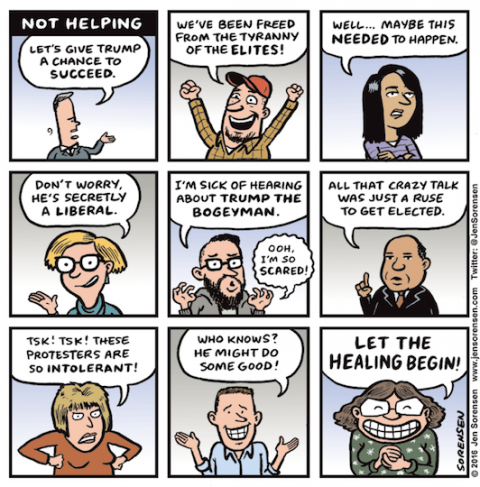- Media Stars Agree to Off-the-Record Meeting With Trump, Break Agreement, Whine About Mistreatment – Glenn Greenwald (The Intercept)
- Commander-In-Tweet: Trump's Social Media Use And Presidential Media Avoidance – Tamara Keith (NPR)
- TV Pundits Eager to Make Trump the New 'Normal' – Rohit Chandan (Fairness and Accuracy in Reporting
- Meet the Professor Calling Out the Fake and Misleading News Sites Clogging Your Facebook Feed – Jared Keller (Pacific Standard)
- According to Snopes, Fake News Is Not the Problem – Jessi Hempel (Backchannel)
- Silicon Valley Helped Create Trump, and That’s Bad for It – Noam Cohen (New York Times)
Media Stars Agree to Off-the-Record Meeting With Trump, Break Agreement, Whine About Mistreatment
By Glenn Greenwald
November 22, 2016
The Intercept
Why would journalistic organizations agree to keep their meeting with Donald Trump off the record? If you’re a journalist, what is the point of speaking with a powerful politician if you agree in advance that it’s all going to be kept secret? Do they not care what appearance this creates: the most powerful media organizations meeting high atop Trump Tower with the country’s most powerful political official, with everyone agreeing to keep it all a big secret from the public? Whether or not it actually is collusion, whether or not it actually is subservient ring-kissing in exchange for access, it certainly appears to be that.
Why do media organizations need to have cooperative access agreements with politicians? Just report on and investigate what he says and does. Don’t agree to ground rules that limit or subvert your ability to report aggressively. Don’t turn yourselves into vassals in order to be granted access to the royal court.
Commander-In-Tweet: Trump's Social Media Use And Presidential Media Avoidance
By Tamara Keith
November 18, 2016
NPR
An unprecedented feature of Donald Trump's successful campaign for president was his personal use of Twitter and it has continued as Trump meets with advisers and potential members of his cabinet. If this continues into Trump's presidency, the method will be new, but the approach will be in line with a long tradition of presidents going around the so-called filter of the press.
TV Pundits Eager to Make Trump the New 'Normal'
By Rohit Chandan
November 18, 2016
Fairness and Accuracy in Reporting
The danger is that by normalizing Trump—a candidate distinguished by anembrace of political violence and open appeals to ethnic nationalism who boasted of getting away with sexual assaults—these commentators will make racist and sexist bullying an acceptable way to run for public office.
Meet the Professor Calling Out the Fake and Misleading News Sites Clogging Your Facebook Feed
By Jared Keller
November 15, 2016
Pacific Standard
Facebook founder and CEO Mark Zuckerberg flatly rejected the assertion that Facebook shaped the election. “Of all the content on Facebook, more than 99 percent of what people see is authentic,” he insisted; of course, the remaining 1 percent of users still encompass some 19.1 million people. Despite Zuckerberg’s denial, Facebook is now actively reassessing its role in distributing false information. And while the social media giant is taking tiny steps toward addressing the issue — excluding fake news sites from its advertising network, for one — it may take a renegade task force within Facebook itself to force how the company to truly understand its outsized influence on how Americans see the world at large.
According to Snopes, Fake News Is Not the Problem
By Jessi Hempel
November 16, 2016
Backchannel
This is the state of truth on the internet in 2016, now that it is as easy for a Macedonian teenager to create a website as it is for The New York Times, and now that the information most likely to find a large audience is that which is most alarming, not most correct. In the wake of the election, the spread of this kind of phony news on Facebook and other social media platforms has come under fire for stoking fears and influencing the election’s outcome. Both Facebook and Google have taken moves to bar fake news sites from their advertising platforms, aiming to cut off the sites’ sources of revenue.
But as managing editor of the fact-checking site Snopes, Brooke Binkowski believes Facebook’s perpetuation of phony news is not to blame for our epidemic of misinformation. “It’s not social media that’s the problem,” she says emphatically. “People are looking for somebody to pick on. The alt-rights have been empowered and that’s not going to go away anytime soon. But they also have always been around.”
Silicon Valley Helped Create Trump, and That’s Bad for It
By Noam Cohen
November 18, 2016
New York Times
Facebook explains that it can’t be held accountable for the material shared on its site because it is not a news organization.
Nice try. These sites are not neutral platforms, but robust businesses that have financial incentives to share fake news and encourage their users to stew in their own hateful juices; the more they stew, the more time they spend on the site. In the case of a fake news story that claimed that Mr. Trump won the popular vote, Google made money because it arrived as an advertisement keyed to searches about the election results.
That wasn’t the only role that Silicon Valley played in this election. Tech companies didn’t face the same degree of populist assault as the banks, but they came to embody as much as Wall Street the harsh, unequal American economy that didn’t care a lick for the people left behind.


Spread the word